Demolition Contractors Barrington
Top Structure Demolition in Barrington
Get multiple Demolition Contractors Near Me quotes for your project today! Compare profiles, reviews, accreditations, portfolio, etc... and choose the best service.

Torshel Tornado Shelters & Safe Rooms
53 reviewsBrick, USThe fastest way to get your storm shelter is by selecting the product or products of your interest. Then, proceed to fill out the contact form online, and a sales representative will be in touch with you. The installation time for the above and in-ground units is 1-3 weeks, depending on your location. Commercial building installation time is 3-6 weeks, depending on the size and your location. If you are building a house, make sure that you order your storm shelter ahead of time. Thank you very much, stay safe! Financing Options We’ve Been Protecting Families & Businesses For Over 9 Years Buying a storm shelter is an important decision. Torshel is committed to helping you choose the best type of shelter for both your home and budget. Both underground shelters and safe rooms offer maximum protection for storms. We encourage our clients to compare the quality of our shelters, methods of installation, and the reputation of the companies. There have been a few cases where other companies have poorly installed in-ground shelters that slip out of the ground. As a result, people can be terribly injured, and in some cases, death may occur. Some companies put profit over the lives of those who will use their products. At Torshel we work to make sure that we save and help protect as many lives as possible. We only install the highest quality storm shelters available in the market and stand behind our work by offering a 10-year warranty. We make ourselves available before and after the shelter’s installation. Commercial and Residential Storm Shelters Welcome to Torshel Storm Shelters, a leading company in the storm shelter and safe room industry. We have the best products, at an affordable price. We proudly install and serve Alabama, Arkansas, Florida, Kentucky, Louisiana, Mississippi, Tennessee, Texas, Georgia, and surrounding states. However, we sell, and ship storm shelters anywhere in the United States. We have clients in Dallas, New York, Miami, Seattle, Los Angeles, and many rural areas around the country. Enjoy your visit to our website. Take a look at our videos, pictures, and testimonials from multiple clients. We know this is an important decision. Know that if you chose us, you will get great customer service and a top-of-the-line storm shelter backed by a 10-year warranty. Torshel offers discounts to customers who purchase two or more units. Protect your family with a Torshel shelter manufactured to withstand EF5 category tornadoes. Torshel offers underground storm shelters and above-ground safe rooms of various sizes that meet or exceed FEMA’s stringent safety standards. Our tornado shelters are also more durable than traditional storm cellars. Let your neighbors, coworkers, and friends know about your purchase of your storm shelter. If they want to buy one during the same delivery and installation trip, everyone can save a lot. A case in point, Mr. Kyle told Mr. Will about his new in-ground shelter; Will liked the product and decided to purchase one. Torshel delivered and installed two units, and offered them discounts! John and George partnered installing a big shelter in-between their houses, both saved and both of their families can have direct access to the shelter. Commercial Storm Shelters The most valuable asset of any company is not its facilities, machines or products. It’s their team of employees, executives, and clients. Torshel can help protect them while at work with a commercial multipurpose storm shelter, panic room, and safe vault in the event of a tornado, hurricane, robberies, shootings, and other types of incidents that may put in danger their safety. You, your staff, and clients will have a peace of mind by having a steel safe room ready for any threating occasion. Storm Shelter in your Garage Torshel storm shelters are made of structural heavy-duty steel and are one of the bests available in the United States. Our storm shelters are well constructed and properly anchored. Such units will withstand an EF5 tornado according to engineers and professionals at Texas Tech University. They are the perfect solution for the elderly, people with disabilities, claustrophobia, and clients who want an easy to reach safe room in their garage. Inground Tornado Shelters For clients that live in mobile homes, or do not have a garage, we offer underground outdoor shelters. These underground units reflect Torshel’s latest technology. They come with a 13” x 13” bullet-resistant window made of 1.5” polycarbonate. The window allows natural light to flow inside the shelter. You won’t feel entrapped. Torshel’s Newest and High Technology Feature! 4-6 cubic yards of 3,000 PSI concrete will keep the unit inside the ground and prevent it from floating. Let’s Keep Your Family Safe The sooner the better, fill our online form and one of our talented representatives will contact you to help you with any question you might have.
- Services
- Why Us?
- Testimonials
- Gallery
Get Quote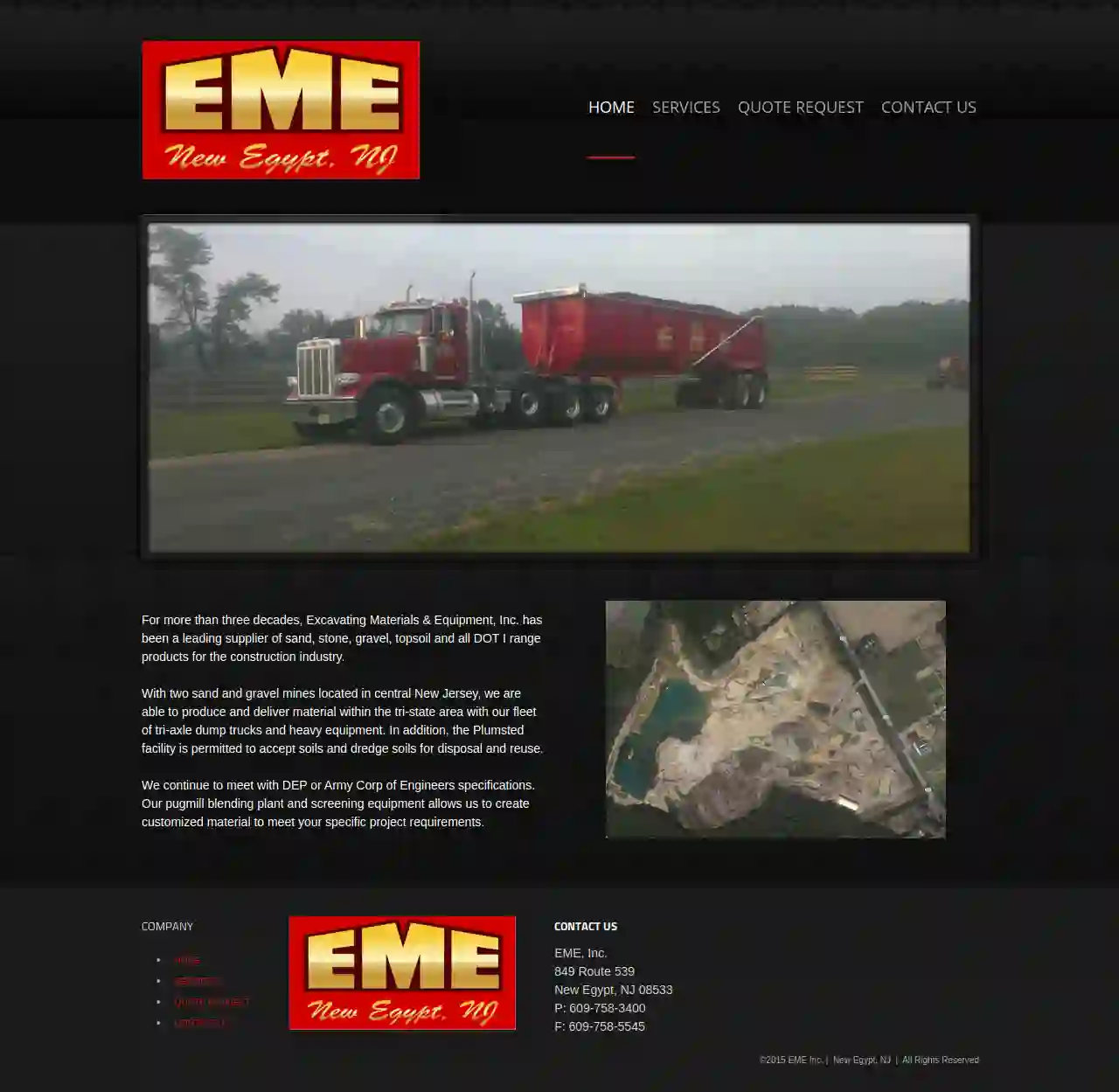
Excavating Materials & Equipment, Inc.
37 reviews849 Route 539, New Egypt, 08533, USExcavating Materials & Equipment, Inc. (EME) For over three decades, EME has been a leading supplier of sand, stone, gravel, topsoil, and DOT I range products for the construction industry in central New Jersey. We operate two sand and gravel mines, ensuring we can efficiently produce and deliver materials within the tri-state area using our fleet of tri-axle dump trucks and heavy equipment. Our commitment to quality extends beyond material supply. The Plumsted facility is permitted to accept soils and dredge soils for disposal and reuse, adhering to strict DEP and Army Corp of Engineers specifications. Our pugmill blending plant and screening equipment allow us to create customized materials tailored to your specific project requirements.
- Services
- Why Us?
- Gallery
Get Quote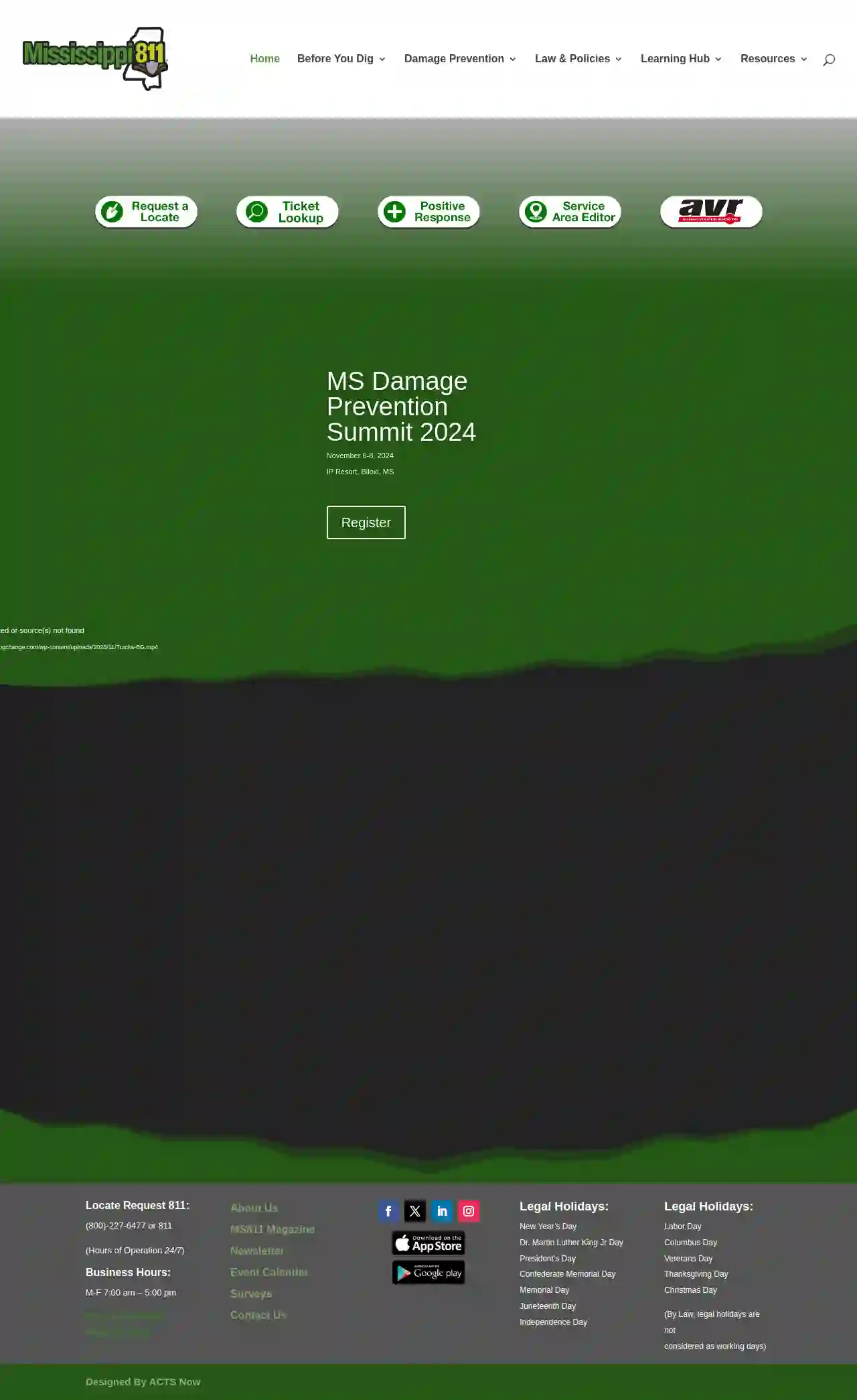
Mississippi 811, Inc.
4.823 reviews200 Country Pl Pkwy, Pearl, 39208, USAbout MS811 MS811 is a vital resource for anyone planning to dig in Mississippi. Our mission is to protect underground infrastructure and ensure the safety of excavators, homeowners, and the public. We provide a free, easy-to-use service that helps you locate underground utilities before you dig. By calling 811 or visiting our website, you can request a locate request and ensure that you are digging safely. We are committed to providing our customers with the highest level of service and support. Our team of experts is available 24/7 to answer your questions and help you navigate the process of digging safely. We also offer a variety of resources and information to help you understand the importance of damage prevention and the laws and regulations that govern excavation in Mississippi. We believe that everyone has a role to play in protecting underground infrastructure. By working together, we can prevent damage to utilities and ensure the safety of our communities.
- Services
- Why Us?
- Gallery
Get Quote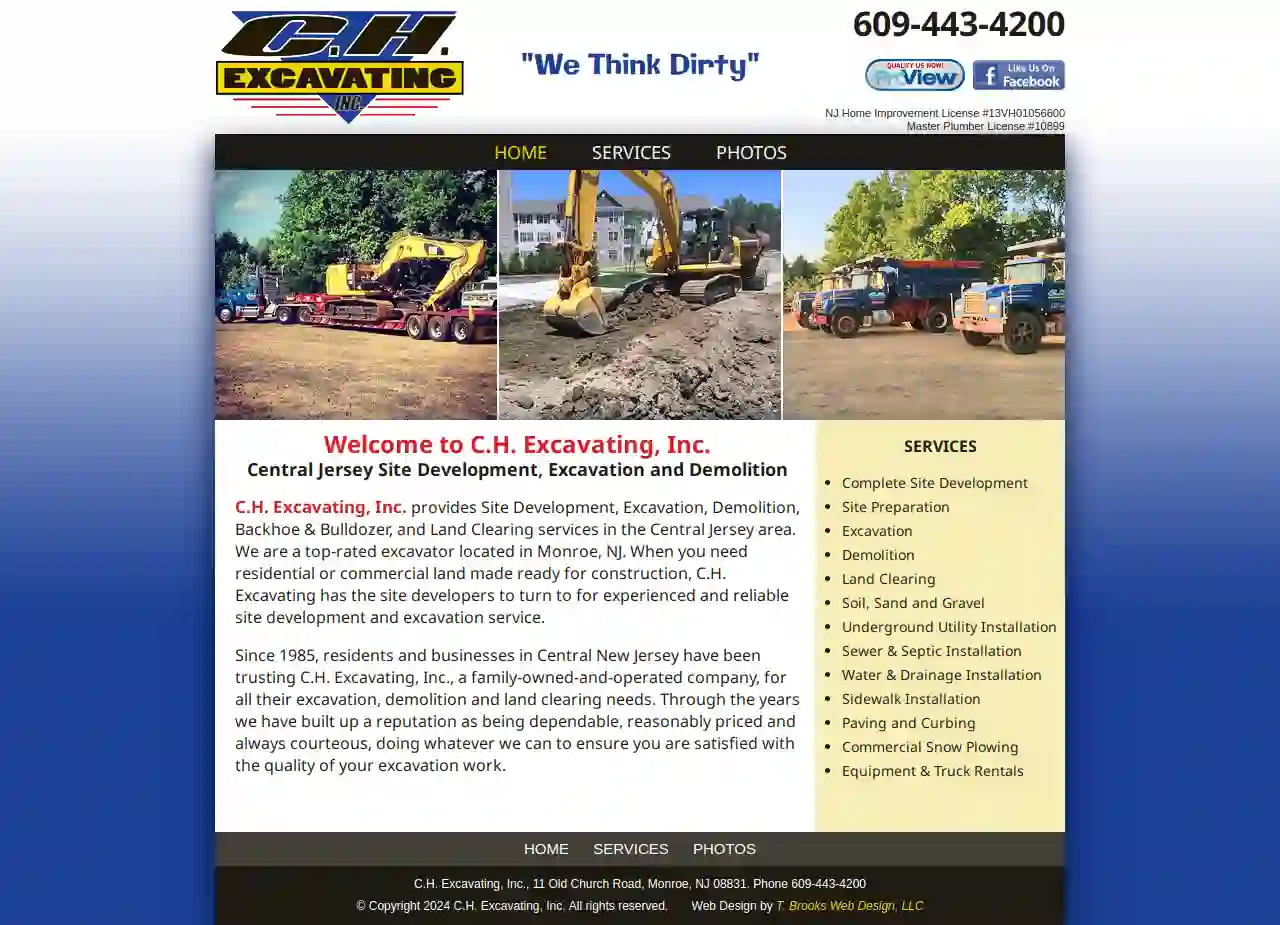
C H Excavating Contractors Inc
53 reviews11 Old Church Road, Monroe, 08831, USWelcome to C.H. Excavating, Inc. Central Jersey Site Development, Excavation and Demolition C.H. Excavating, Inc. provides Site Development, Excavation, Demolition, Backhoe & Bulldozer, and Land Clearing services in the Central Jersey area. We are a top-rated excavator located in Monroe, NJ. When you need residential or commercial land made ready for construction, C.H. Excavating has the site developers to turn to for experienced and reliable site development and excavation service. Since 1985, residents and businesses in Central New Jersey have been trusting C.H. Excavating, Inc., a family-owned-and-operated company, for all their excavation, demolition and land clearing needs. Through the years we have built up a reputation as being dependable, reasonably priced and always courteous, doing whatever we can to ensure you are satisfied with the quality of your excavation work.
- Services
- Why Us?
- Gallery
Get Quote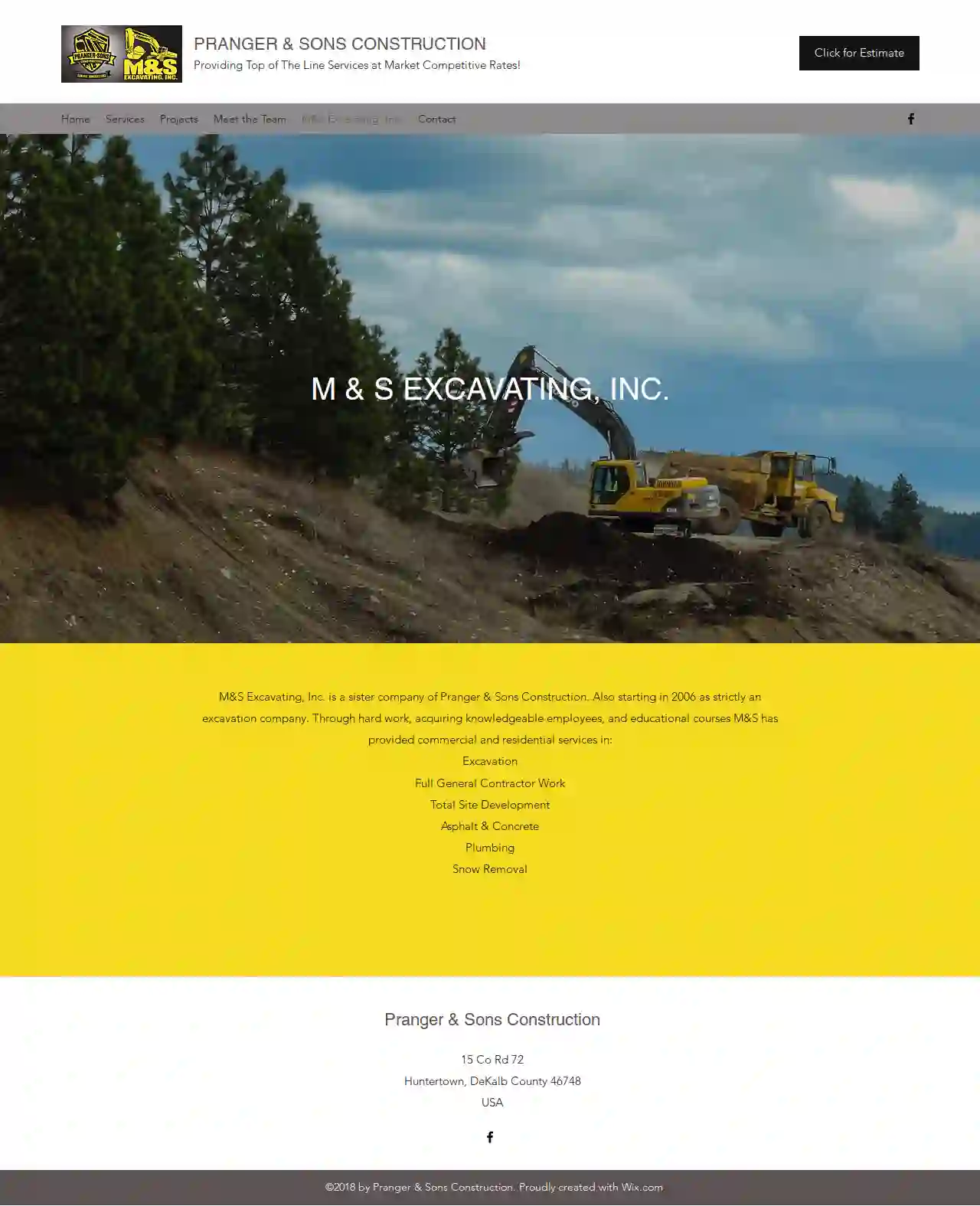
M & S Excavating Inc
56 reviews15 Co Rd 72, Huntertown, 46748, USM & S EXCAVATING, INC. M&S Excavating, Inc. is a sister company of Pranger & Sons Construction. Also starting in 2006 as strictly an excavation company. Through hard work, acquiring knowledgeable employees, and educational courses M&S has provided commercial and residential services in: Excavation Full General Contractor Work Total Site Development Asphalt & Concrete Plumbing Snow Removal
- Services
- Why Us?
- Gallery
Get Quote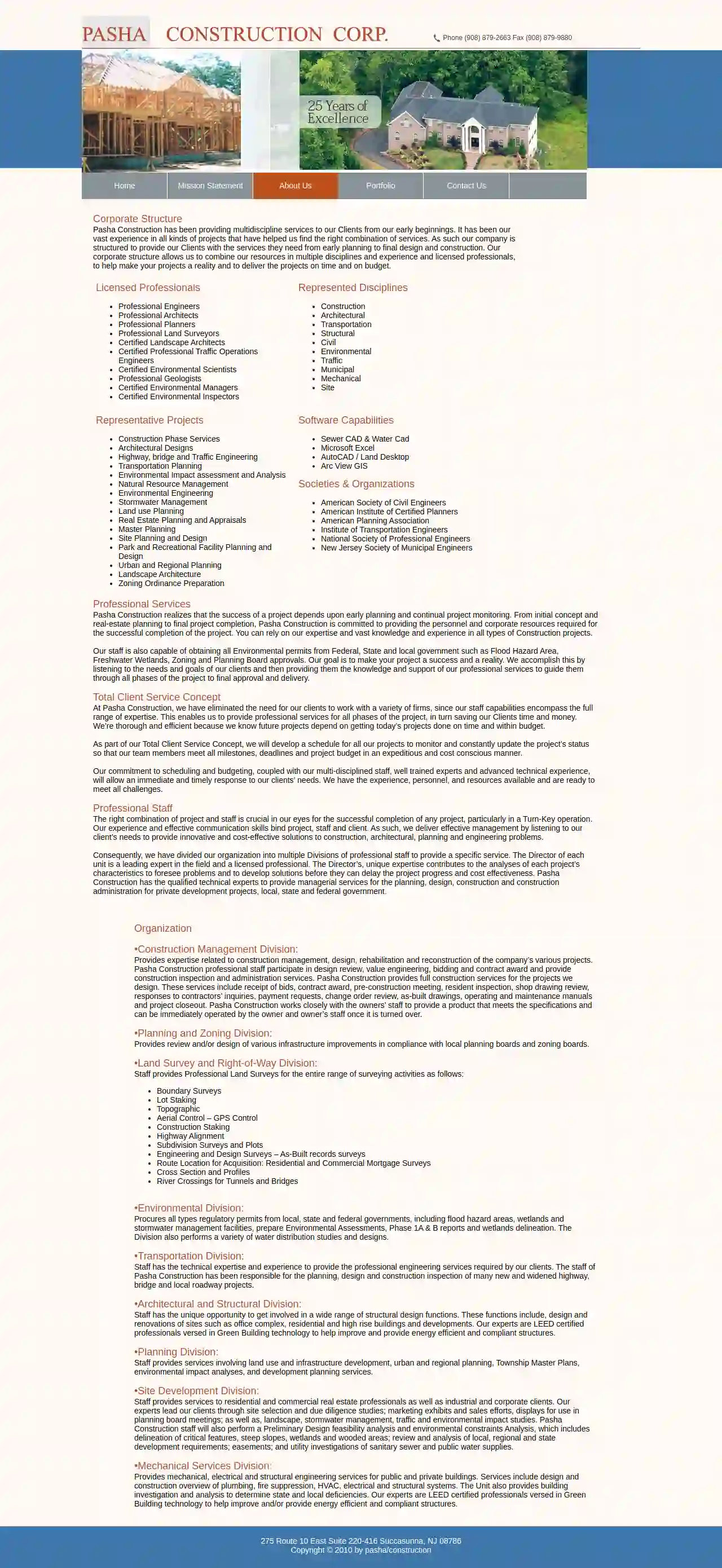
Pasha Construction
275 Route 10 East Suite 220-416, Succasunna, 08786, USAbout Us Pasha Construction has been providing multidiscipline services to our Clients from our early beginnings. It has been our vast experience in all kinds of projects that have helped us find the right combination of services. As such our company is structured to provide our Clients with the services they need from early planning to final design and construction. Our corporate structure allows us to combine our resources in multiple disciplines and experience and licensed professionals, to help make your projects a reality and to deliver the projects on time and on budget. Licensed Professionals Professional Engineers Professional Architects Professional Planners Professional Land Surveyors Certified Landscape Architects Certified Professional Traffic Operations Engineers Certified Environmental Scientists Professional Geologists Certified Environmental Managers Certified Environmental Inspectors Represented Disciplines Construction Architectural Transportation Structural Civil Environmental Traffic Municipal Mechanical Site Representative Projects Construction Phase Services Architectural Designs Highway, bridge and Traffic Engineering Transportation Planning Environmental Impact assessment and Analysis Natural Resource Management Environmental Engineering Stormwater Management Land use Planning Real Estate Planning and Appraisals Master Planning Site Planning and Design Park and Recreational Facility Planning and Design Urban and Regional Planning Landscape Architecture Zoning Ordinance Preparation Software Capabilities Sewer CAD & Water Cad Microsoft Excel AutoCAD / Land Desktop Arc View GIS Societies & Organizations American Society of Civil Engineers American Institute of Certified Planners American Planning Association Institute of Transportation Engineers National Society of Professional Engineers New Jersey Society of Municipal Engineers Professional Services Pasha Construction realizes that the success of a project depends upon early planning and continual project monitoring. From initial concept and real-estate planning to final project completion, Pasha Construction is committed to providing the personnel and corporate resources required for the successful completion of the project. You can rely on our expertise and vast knowledge and experience in all types of Construction projects. Our staff is also capable of obtaining all Environmental permits from Federal, State and local government such as Flood Hazard Area, Freshwater Wetlands, Zoning and Planning Board approvals. Our goal is to make your project a success and a reality. We accomplish this by listening to the needs and goals of our clients and then providing them the knowledge and support of our professional services to guide them through all phases of the project to final approval and delivery. Total Client Service Concept At Pasha Construction, we have eliminated the need for our clients to work with a variety of firms, since our staff capabilities encompass the full range of expertise. This enables us to provide professional services for all phases of the project, in turn saving our Clients time and money. We’re thorough and efficient because we know future projects depend on getting today’s projects done on time and within budget. As part of our Total Client Service Concept, we will develop a schedule for all our projects to monitor and constantly update the project’s status so that our team members meet all milestones, deadlines and project budget in an expeditious and cost conscious manner. Our commitment to scheduling and budgeting, coupled with our multi-disciplined staff, well trained experts and advanced technical experience, will allow an immediate and timely response to our clients’ needs. We have the experience, personnel, and resources available and are ready to meet all challenges.
- Services
- Why Us?
- Gallery
Get Quote
VanSant Environmental Landscaping & Site Work
51 reviews204 North Leipzig Avenue, Galloway, 08215, USWho We Are Experienced Commercial and LARGE Residential General Site work, Landscape, and Forestry EXCAVATION Contractors. We offer permitting & environmental landscaping consulting services as well. Our Team Barry VanSant Barry is the owner and the company's Horticulturist and Landscape Designer/Consultant. He has over 45 years experience in multiple areas of the industry. Samuel VanSant Sam is the company's Project and Construction Manager. He oversees the day-to-day operations and all heavy equipment operations. Adam Wolff Adam is our field engineer. He is a graduate of East Carolina University in construction management and LEED Certified. Frequently Asked Questions Are you insured and licensed? We have all necessary licenses for our area, and we carry insurance for all of our projects. What kind of landscaping do you do? Our specialty is in natural and native plant material and methods that fit the ecology of our area. We proudly support and volunteer for: Team Rubicon USA Volunteer Partner Since Oct. 2016 Habitat For Humanity Volunteer Partner Since Oct. 2016 U.S. Fish and Wildlife Services Volunteer Partner Since Dec. 2018
- Services
- Why Us?
- Our Team
- Gallery
Get Quote
Fox Contractors Corp
4.618 reviews5430 W. Ferguson Road, Fort Wayne, 46809, USWe can dig it. To get a job done right, you need to start with someone who really knows what they’re doing. That’s Fox Contractors. Decades of laying the groundwork Since 1948, we’ve been behind projects in and around Indiana that require specialized support with earthmoving and underground utilities. Our expertise can be found on jobs that range from heavy highway and public works to commercial and industrial site development. View Our Certifications Minority Business Enterprise Indiana Veteran Owned Small Business Enterprise Veteran Owned Business After more than 70 years in business, we’ve built a reputation for impeccable work that’s done on time and on budget. That, along with our fair pricing and highly skilled, safety-conscious workforce make us the first choice for project managers who are looking for a reliable partner. Our clients include DOTs, municipalities, general contractors and developers, and we have experience in the healthcare, education and environmental fields. Fox Contractors is proud to be a certified Minority Business Enterprise (MBE) and a 100% signatory contractor with the IUOE, Teamsters and Laborers’ unions. With a headquarters in Fort Wayne and a regional office near Indianapolis, Fox Contractors serves customers across the region and is prequalified with the Indiana, Michigan and Ohio Departments of Transportation. We take care of business – from the ground up. ”Fox places a high value on safety because our people are our #1 asset. We strive to minimize or eliminate hazards all together, so that all employees can work in a safe environment, without losing time. Our safety-first approach is reflected in our extensive training and education, as well as an employee safety commitment that starts from the top down.” Dallas Day, Owner, Fox Contractors Corp.
- Services
- Why Us?
- Testimonials
- Gallery
Get Quote
Blackwater Draw Locality 1
4.556 reviews1500 S. Ave K, Lea Hall Room 163, Portales, 88130, USThe Blackwater Draw Museum seeks to foster preservation and education of the heritage of New Mexico, the Southern High Plains, and the greater Southwest through exhibitions, educational programs, collections, and research, while enriching and supporting the educational goals and mission of ENMU. The Blackwater Draw Museum is a small museum located on the campus of Eastern New Mexico University in Portales, New Mexico. The museum is home to a collection of artifacts from the Blackwater Draw National Historic Landmark, a site that has been inhabited by humans for over 13,500 years. The museum offers a variety of exhibits, educational programs, and research opportunities. Visitors can learn about the history of the Blackwater Draw site, the cultures that have lived there, and the archaeology of the region. The museum also has a collection of artifacts from the Casas Grandes culture, a prehistoric culture that flourished in the Southwest from about 1300 to 1450 AD. The museum is open to the public and offers a variety of tours and programs. The museum is a great place to learn about the history and culture of the Southwest. The Blackwater Draw Museum is a great place to learn about the history and culture of the Southwest. The museum offers a variety of exhibits, educational programs, and research opportunities. Visitors can learn about the history of the Blackwater Draw site, the cultures that have lived there, and the archaeology of the region. The museum also has a collection of artifacts from the Casas Grandes culture, a prehistoric culture that flourished in the Southwest from about 1300 to 1450 AD. The museum is open to the public and offers a variety of tours and programs.
- Services
- Why Us?
- Gallery
Get Quote
SamWel Hydro Excavation
51 reviews7407 Brush College Road, Woodburn, 46797, USExcavating Fort Wayne Since 1999 You'll see our Passion for Perfection in the quality of work we do. Focused, detailed, and honest by keeping the customer's best interest in mind. We are ridiculously honest, ethical business! With over 25 years of experience! We hold tight to the Golden Rule "Do unto others as you want done to yourself" BBB Accredited OSHA Certified Insured Bonded CPR First Aid Certified Health Safety Compliant In Good Standing with the City of Fort Wayne Allen County Surveyors Office Allen County Storm Water Drainage Satisfaction Guaranteed Our slogan is "Done Right the First Time, No Mess Left Behind!" We guarantee your satisfaction! TBH We prefer to lay our heads down at night knowing we did the right thing by choosing what's morally right instead of choosing money!
- Services
- Why Us?
- Accreditations
- Gallery
Get Quote
Over 22,076+ Excavation Contractors on our directory
Our excavation contractors operate in Barrington and surrounding areas!
ExcavationHQ has curated and vetted Top Excavation Pros in and around Barrington. Find a reliable pro today.
Frequently Asked Questions About Demolition Contractors
- Clear the Site: Remove all furniture, appliances, personal belongings, and any valuable items from the structure.
- Secure the Perimeter: Fence off the demolition area to prevent unauthorized access and protect surrounding property.
- Disconnect Utilities: Arrange for the disconnection of electricity, gas, water, and other utilities servicing the building.
- Hazardous Material Abatement: If asbestos, lead paint, or other hazardous materials are present, have them professionally removed before demolition begins.
- Notify Neighbors: Inform your neighbors about the demolition schedule to minimize disruptions and address any concerns.
- Obtain Permits: Ensure all necessary demolition permits are in place before starting work.
- Project Assessment: The demolition contractor evaluates the structure, site conditions, and project requirements.
- Permitting: Obtain necessary demolition permits from local authorities.
- Site Preparation: Secure the site, disconnect utilities, and remove any valuable or reusable items.
- Hazardous Material Abatement: Professionally remove asbestos, lead paint, or other hazardous materials if present.
- Demolition: Execute the chosen demolition method, bringing down the structure safely and efficiently.
- Debris Removal and Site Cleanup: Sort, process, and dispose of demolition debris responsibly. Clean up the site to prepare it for future use.
- Size and Type of Structure: The method should be suitable for the structure's size, height, and construction materials.
- Site Location and Accessibility: The method should be feasible given the site's location, surrounding buildings, and access constraints.
- Environmental Considerations: Prioritize methods that minimize environmental impact, such as deconstruction or selective demolition if feasible.
- Budget: Different demolition methods have varying costs, so choose one that fits your budget.
- Safety: Prioritize methods that ensure worker safety and minimize risks to surrounding areas.
How long does a demolition project take?
How do I prepare my property for demolition?
What are the steps involved in a typical demolition process?
How do I choose the right demolition method for my project?
How long does a demolition project take?
How do I prepare my property for demolition?
- Clear the Site: Remove all furniture, appliances, personal belongings, and any valuable items from the structure.
- Secure the Perimeter: Fence off the demolition area to prevent unauthorized access and protect surrounding property.
- Disconnect Utilities: Arrange for the disconnection of electricity, gas, water, and other utilities servicing the building.
- Hazardous Material Abatement: If asbestos, lead paint, or other hazardous materials are present, have them professionally removed before demolition begins.
- Notify Neighbors: Inform your neighbors about the demolition schedule to minimize disruptions and address any concerns.
- Obtain Permits: Ensure all necessary demolition permits are in place before starting work.
What are the steps involved in a typical demolition process?
- Project Assessment: The demolition contractor evaluates the structure, site conditions, and project requirements.
- Permitting: Obtain necessary demolition permits from local authorities.
- Site Preparation: Secure the site, disconnect utilities, and remove any valuable or reusable items.
- Hazardous Material Abatement: Professionally remove asbestos, lead paint, or other hazardous materials if present.
- Demolition: Execute the chosen demolition method, bringing down the structure safely and efficiently.
- Debris Removal and Site Cleanup: Sort, process, and dispose of demolition debris responsibly. Clean up the site to prepare it for future use.
How do I choose the right demolition method for my project?
- Size and Type of Structure: The method should be suitable for the structure's size, height, and construction materials.
- Site Location and Accessibility: The method should be feasible given the site's location, surrounding buildings, and access constraints.
- Environmental Considerations: Prioritize methods that minimize environmental impact, such as deconstruction or selective demolition if feasible.
- Budget: Different demolition methods have varying costs, so choose one that fits your budget.
- Safety: Prioritize methods that ensure worker safety and minimize risks to surrounding areas.